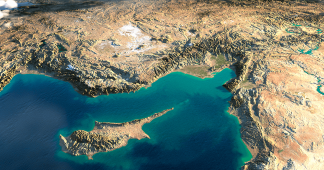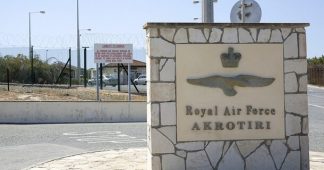By Dimitris Konstantakopoulos
The former Prime Minister of Portugal and former leader of the Socialist International (it still exists for anyone who does not know it), Antonio Guterres, who has been elected as Secretary-General of the UN with the help of the US and of Great Britain, decided, in the midst of the coronavirus pandemic, but also of a pandemic of international crises,to go to Geneva and sit there for almost a whole week.
He did not travel to Geneva to deal with the numerous and threatening world peace crises. He did not go to Switzerland to try to coordinate international efforts to fight coronavirus, or to promote the need to address an extremely urgent climate crisis that directly threatens the very survival of humanity and its civilisation.
No, nothing of that. Mr Guterres is not now concerned so much with the Ukraine, Iran or the tension in the South China Sea, the resurgence of the nuclear and biological weapons threat, or the world debt pandemic.
Mr. Guterres is now burning for peace in Cyprus, a small member state of the European Union in the eastern Mediterranean. There is indeed a conflict in Cyprus that should, if possible, have been resolved long ago, in a democratic and sustainable manner. But the last time guns were heard on the island was in 1974. Why does Mr Guterres consider it more urgent and important to deal with Cyprus rather than the situation in Donbass or Myanmar? Is he merely NATO’s useful idiot?
A conference convened against all the fundamental principles of the UN Charter
In Geneva, the UN Secretary-General is organising and lending the prestige of his office to a conference on the constitution and the international status of the Republic of Cyprus, a member of the European Union and of the United Nations, with the participation of Great Britain and of Turkey. You will agree that is it rather an aberration to invite the state which created the Cyprus problem (Britain) and the state which invaded Cyprus (Turkey) to decide on its constitution!
But in reality, nobody should have been invited to the conference, for a very simple reason. The Republic of Cyprus is an independent state member of the UN and the EU. An international conference, with the participation of any other state to consider and probably decide its constitution is simply unconceivable.
This is already representing the most severe violation of the UN Charter, to say the least. Constitutions of states must not be drafted in international conferences, with the “help” and the agreement of other states. They should be drafted either by constitutional assemblies or other, internal organs of power and decided by the citizens of the states concerned, preferably via referenda. This was the procedure followed in Cyprus until 2016. According to the followed procedure, the representatives of Greek Cypriots and of Turkish Cypriots were negotiating a solution, including a new constitution. If they could agree, their agreement would be subject to a referendum. This method guaranteed that the outcome would be accepted by the population and would lead to a peaceful and stable solution of the Cyprus problem.
Inside Cyprus there have been always (minority) voices criticising this method of inter-communal talks in solving the problem. Some people believed that no dialogue could bear results, if the Turkish troops did not leave the island before the talks. The UN Security Council has been waiting since 1974 for the withdrawal of foreign troops, according to the resolutions it voted. Some other people in Cyprus have proposed convening a Constituent Assembly.
But, in any case, the intercommunal talks with a provision for a referendum, even if they have been unable to solve the Cyprus problem, constitute a safety net against the very real possibility of trying to impose on the population of the island a monstrous solution it does not want, as they tried to do it in 2002-04, thus creating more instability and a high probability of armed conflicts on the island, like in the past, or, in the most extreme case, even a war between Greece and Turkey.
Already by convening this conference, Mr. Guterres is returning us to the period of the Holy Alliance, which ruled Europe after Napoleon’s defeat. A period we thought was resolved definitely after WWII, with the creation of the United Nations and the international recognition of the principle of the self-determination of peoples and nations.
We hope that this strange insistence on solving the Cyprus problem now is not connected with new adventurous plans in the Middle East or against Russia, but, given the history of the Cyprus conflict, we cannot be so sure.
A conference about the EU without the EU
By the way, any agreement that may be found in Geneva will have a very big impact on the EU itself, its functioning and its international relations. Still Mr Guterres has banned the EU from sending even observers to a conference about the future of one of its members and of itself, much more so than the rather erratic leaders of today’s EU imagine.
Because, among other things, the plan discussed in Geneva for a solution to the Cyprus problem gives Turkey, long before it joins the EU itself, veto rights in the EU, through the equal sharing of Nicosia in the EU vote among Greek Cypriots and Turkish Cypriots, controlled tightly by Ankara. In a sense it puts Turkey in the EU before it gets in! This, of course, makes London extremely happy, as it provides Britain with a precious weapon with which it will be able to exercise pressure, influence and even blackmail the EU, even after Brexit, also tying, possible, Turkey to the West. This has the potential of provoking huge crises.
This would have happened as early as 2004, if the vast majority of the citizens of the Republic of Cyprus had not rejected the Annan Plan in the referendum that took place at that time, ignoring the unprecedented pressures and clear and open threats they received from the Americans, the Europeans and a very large part of the Cypriot and Greek “elite”. (*)
A small state of global importance. West and Cyprus
Cyprus is an island in the Eastern Mediterranean, colonised in two waves by Minoan Greeks during the second millennium BC and is still inhabited today by an overwhelming majority of Greeks (82% of the population). The Republic of Cyprus is a small state. Its global geopolitical importance, however, is inversely proportional to its size and this has been the curse for its people over time, since it saw the island become the object of conquering invasions of all the empires that wanted to dominate the Mediterranean and the world.
Any form of solution to the Cyprus problem will profoundly affect not only the balance between Greece, Turkey and the European Union, but all global balances. This makes even more strange that the UN General Secretary did not care to invite, even as observers, the representatives of the five permanent members of the Security Council, for everybody to be somewhat more confident that the solution to be found will not disrupt, but consolidate peace and stability in the Meditrranean region and internationally.
This is not the first time Western powers have been interested in “solving” the Cyprus problem. Each time they did so, no peace was established in the Mediterranean, coups were provoked (in Greece and Cyprus), strife broke out in Cyprus itself, and Greece and Turkey nearly went to war. This was because their permanent aim was not to solve the conflict between Greek Cypriots and Turkish Cypriots, which they did everything to create in the first place, but to use it in order to take away control of the island from its inhabitants, to control it completely, because of its great role for all their interventions in the wider Middle East and in the context of the Cold War with the Soviet Union in the past, with Russia now. ‘Whoever controls Cyprus, Crete, Malta and Gibraltar reigns in the world’, Henry Kissinger is reported to have said .
And because this is precisely the case, the CIA organised a coup in Athens in 1967 and then used the dictatorship imposed by itself to organise one in Nicosia in 1974, an exact copy of the coup organised by Kissinger in 1973, in Santiago de Chile. The only difference was that Makarios survived, unlike Allende and His Excellency Mr. Kissinger implemented the second phase, encouraging the Turkish invasion of Cyprus, after having previously ensured that the CIA-controlled Greek armed forces would not react to it. The end result of all this was that the Cypriot people suffered more losses as a percentage of their population than Iraq in the invasion of 2003 and, also, the ethnic cleansing of hundreds of thousands of Greeks from the north of the island.
The Cyprus problem itself and the Greek Cypriots – Turkish Cypriots conflict were created historically by Britain itself, in order never to allow the independence of the island that was its colony, by applying the principle of “divide and conquer”, both in Cyprus and between Greece and Turkey. On 28 July 1954, the Honourable Harry Hopkins, Minister of Colonies of the United Kingdom, speaking to the House of Commons, said that Cyprus belonged to those parts of the Commonwealth which can never expect to become fully independent. This has been the settled policy of the British state ever since, and this is the only reason that London and Washington are dragging Mr. Guterres to Geneva.
The conference convened in Geneva does not, and cannot, by its very composition, seek a democratic and sustainable solution to the Cyprus problem in line with the principles of the UN. Such a solution must be found by the inhabitants of the island themselves and, if found by their representatives, it must be approved or rejected in a referendum by the citizens themselves. No one outside Cyprus has the right and cannot have a say either on the internal or the international status of the Republic of Cyprus, much more, those invited to Geneva by Guterres cannot and do not have the right to have a say on Cyprus at the behest of Washington and London, the latter the power that created the Cyprus problem, and Ankara the power that invaded Cyprus in 1974.
From the Annan plan to the Geneva conference. The role of Victoria Nuland
In 2004, the architect of the Annan Plan, the British Lord Hannay, losing his temper, told CNN Turk, that if the Greek Cypriots (i.e. 82% of the Cypriot population) vote no in the referendum on the Annan Plan, “we will put it to them again and again in a referendum until they say yes.”
In order to make this possible, they tried everything possible both in the foreground and the background of the political scenes in Cyprus, in Greece and internationally, since 2004. We cannot exclude that one of the motivations of the economic wars launched against Greece and Cyprus, was to create conditions for the Annan plan to be adopted.
But it proved impossible to change the deeper consciousness of Cypriot citizens. It did not appear that they would be prepared to vote for a solution that would end the independence and sovereignty of the state in which they lived, and also end democracy, cancelling any advantages for Cyprus from the EU, and getting Turkey to the EU via the Cypriot window.
The case was leading to a dead end. But the word stalemate is unknown to the former US Secretary of State in charge of the Cyprus issue, Victoria Nuland, as proved by her so important role, as adviser to Dick Cheney, in the preparation of the 2003 invasion of Iraq, beginning a series of disasters in the Middle East that are not yet over, as well as her leading role in the 2014 Kiev coup, which destroyed relations between Europe and Russia, to the benefit of the United States, and launched the new Cold War.
Mrs. Nuland, in cooperation with the British state, always keen to play a central role in every dirty business of this world, after realizing it was impossible to make Cypriots commit suicide by voting for the monstrous plans elaborated by British lords, conceived the formula of this international conference, with the sole aim of abolishing the existing Cypriot state through an international agreement, as she could not remove it from the scene by referendum. The mechanism of the European Union, which probably acts internationally as an American Union, was also involved in the conspiracy. This was illustrated by the carelessness of Mrs Morgherini, who said that the EU is ready to recognise any state that emerges from the Geneva conference!
The implementation of the idea, with which Ankara also agreed, was undertaken by the UN General Secretariat and the US-dependent politicians of Cyprus and Greece, already crushed by the economic wars against both countries.
What will now happen if this conference succeeds in its aims?
An unfair solution that they do not want and that is not sustainable will be imposed on the Cypriot people. Clarity in sovereignty relations protects peace. The “constructive ambiguity” of British diplomacy is the way to provoke conflict. That is why there is a high probability that the negotiated solution will not work, but will cause, as the British and American plans for Cyprus have in the past, bloody conflicts between Greek Cypriots and between Greek Cypriots and Turkish Cypriots, and also exacerbate the tension between Greece and Turkey.
Any unjust, undemocratic solution in Cyprus, imposed on its inhabitants against their will, will not bring peace closer to Cyprus and the Mediterranean. It will create the conditions for new conflicts, threaten peace in the eastern Mediterranean and become a ticking time bomb for the European Union itself. It will also contribute to the probability of new adventures in the Middle East and against Russia.
( * ) By equating 82% of Greek Cypriots with 18% of Turkish Cypriots, the Annan Plan abolished majority rule, i.e. democracy. Because this “state” would not be able to take decisions, the UN Secretary-General (not the Security Council) would appoint three foreign judges who would concentrate all final executive, legislative and judicial power in their hands, in violation of the principle of separation of powers and of any concept of national and popular sovereignty. Most likely, based on international political conditions, these judges would express the interests of the United States, Britain and Israel. These judges, and a plethora of other international officials, appointed by the UN Secretary-General to critical posts in the new state, would, after the expiration of their term, appoint their successors. The new “state” would not have the fundamental right of all states to self-defense and would not have its own armed forces. The Annan plan is probably the most monstrous constitution that has been proposed in world history and constitutes a complete overthrow of all the fundamental principles that have applied after the Renaissance, the Enlightenment, the French, English and American Revolutions, as well as after the victory over Nazism and the establishment of the UN. Despite its rejection, this plan remains on the negotiating table on the Cyprus issue and it is the basis for the negotiations now held in Geneva.










